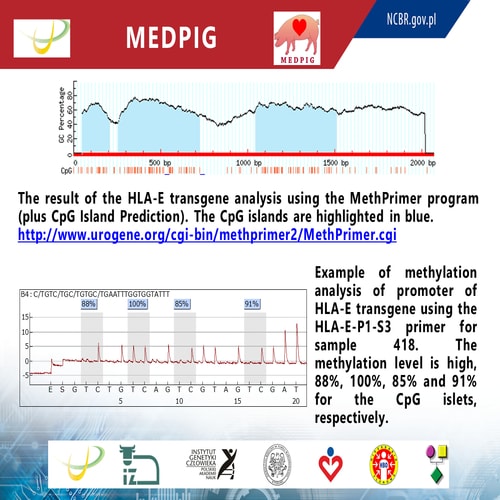
Marlena Szalata
Poznan University of Life Sciences, Poland
Title: Methylation level of HLA-E transgene in the xenogeneic tissues of transgenic pigs
Biography
Biography: Marlena Szalata
Abstract
Statement of the Problem:
Epigenetics involves studies of changes in gene expression not associated with changes at DNA sequence level. The best characterized epigenetic mechanism involved in control of gene expression is DNA methylation. Methylation of cytosines in CpG island within promoters usually causes gene silencing. In transgenic animals we are interested not only in introduction of transgene but also in its activity. We have prepared transgenic pigs for xenotransplantation purposes with decreased recognition by human immune system by introduction of the human HLA-E gene under elongation factor 1 alpha promoter (EF-1α). Activity of HLA-E transgene was already confirmed on molecular level and flow cytometry. The purpose of this study was evaluation of specific methylation of HLA-E transgene.
Methodology & Theoretical Orientation: Genomic DNA was modified by bisulfite conversion and PCR products were analysed using pyrosequencing method. The most important steps were DNA isolation and DNA bisulfite conversion. Pyrosequencing enabled quantification of the specific methylation level of transgene.
Findings: The total level of methylation of the HLA-E transgene promoter was approximately 90% (range 67-100%) and the HLA-E gene 73.79% (29-100%). The obtained results of the HLA-E transgene methylation were compared to the results of transgene expression, which showed that the level of transgene expression in transgenic animals was stable, regardless of pig generation. This suggest, that level of methylation of transgene promoter does not affect directly its biological activity estimated by flow cytometry.
Financed by National Centre for Research and Development (no INNOMED/I/17/NCBR/2014) within framework of INNOMED programme Development of an innovative technology using transgenic porcine tissues for biomedical purposes. Acronym MEDPIG.
Image:

Recent Publications (minimum 5)
- Cheung NKM, Nakamura R, Uno A, Kumagai M, Fukushima HS, Morishita S, Takeda H (2017) Unlinking the methylome pattern from nucleotide sequence, revealed by large-scale in vivo genome engineering and methylome editing in medaka fish. PLoS Genet 13(12):e1007123.
- Gödecke N, Zha L, Spencer S, Behme S, Riemer P, Rehli M, Hauser H, Wirth D (2017) Controlled re-activation of epigenetically silenced Tet promoter-driven transgene expression by targeted demethylation. Nucleic Acids Research 45(16):e147.
- Hryhorowicz M, Zeyland J, Słomski R, Lipiński D (2017) Genetically Modified Pigs as Organ Donors for Xenotransplantation. Molecular Biotechnology 59(9-10):435-44
- Kimsa-Dudek M, Strzalka-Mrozik B, Kimsa MW, Blecharz I, Gola J, Skowronek B, Janiszewski A, Lipinski D, Zeyland J, Szalata M, Slomski R, Mazurek U (2015) Screening pigs for xenotransplantation: expression of porcine endogenous retroviruses in transgenic pig skin. Transgenic Research 24(3):529-536.
- Nuo MT, Yuan JL, Yang WL, Gao XY, He N, Liang H, Cang M, Liu DJ (2016) Promoter methylation and histone modifications affect the expression of the exogenous DsRed gene in transgenic goats. Genetics and Molecular Research 15(3).
